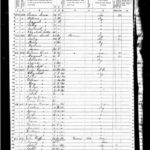
Date of Birth
1788
Place of Birth
North Carolina
Towns / Cities Moved Into
Clay, Kentucky
Known Occupation
Freed slave
Religion
-
Spouse
-
Death Information
Year of death
1853
Place of death
Clay, Kentucky
Cause of death
-
Obituary

Parents

Joseph Charles Spencer

-
Marital Status


-
Siblings








Children
















Narrative / Story
George Spencer Freeman: A Life of Resilience and Legacy
Born in 1790 in Dryden, Lee County, Virginia, USA, George Spencer Freeman’s life began in an era of profound change and challenge. As a person of mixed heritage, George’s early years were marked by the complexities of racial dynamics in a society where freedom was a distant dream for many.
George’s father, Capt. Joseph Charles Spencer, played a significant role in his life. In 1814, Joseph made a significant decision by freeing at least one of his slaves, George Freeman. This act, rooted in the belief that all men should be free, marked a pivotal moment in George’s life, setting him on a path toward self-determination.
Despite the freedom granted by his father, George’s life as a freed slave was fraught with challenges. He navigated a society that was still deeply divided by race and class. His work life, like many of his contemporaries, would have been a constant struggle for recognition and equality. The socio-economic barriers of the time meant that opportunities for freed slaves were limited, often confined to labor-intensive jobs with little security or prospects for advancement.
George’s journey took him to Clay, Kentucky, where he became a notable figure in the local community. His resilience and strength of character were evident in his commitment to his family and his community. In Kentucky, he met Clarissa Centers, with whom he shared a deep and enduring love. Although their union was not formalized in marriage, their relationship was a testament to their unbreakable bond.
Together, George and Clarissa raised ten children, including Hiram Freeman, born in 1819, and Rebacca Centers. George’s role as a father was characterized by unwavering dedication and a profound sense of responsibility. He instilled in his children a deep sense of pride in their heritage and the importance of family.
The backdrop of George’s life was a period of significant historical events. Notably, the Treaty of Bucharest in 1812, signed between the Ottoman Empire and the Russian Empire, marked the conclusion of the Russo-Turkish War of 1806–1812. This treaty, and the broader geopolitical changes it represented, added layers of complexity to George’s personal journey toward freedom.
George’s life was also intertwined with the broader currents of the Napoleonic Wars. The conflict between the Ottoman Empire and the Russian Empire, influenced by tensions with France in the Balkan Peninsula, was a reminder of the turbulent world in which he lived.
In 1853, at the age of 62 or 63, George Spencer Freeman passed away in Kentucky. His death marked the end of a life that had been a testament to the strength of the human spirit. The burial details of George remain unknown, adding a layer of mystery to his final resting place.
George Spencer Freeman’s legacy is carried forward through his children and the community he helped shape. His life story is a poignant reminder of the enduring power of the human spirit and the pursuit of freedom and family.

